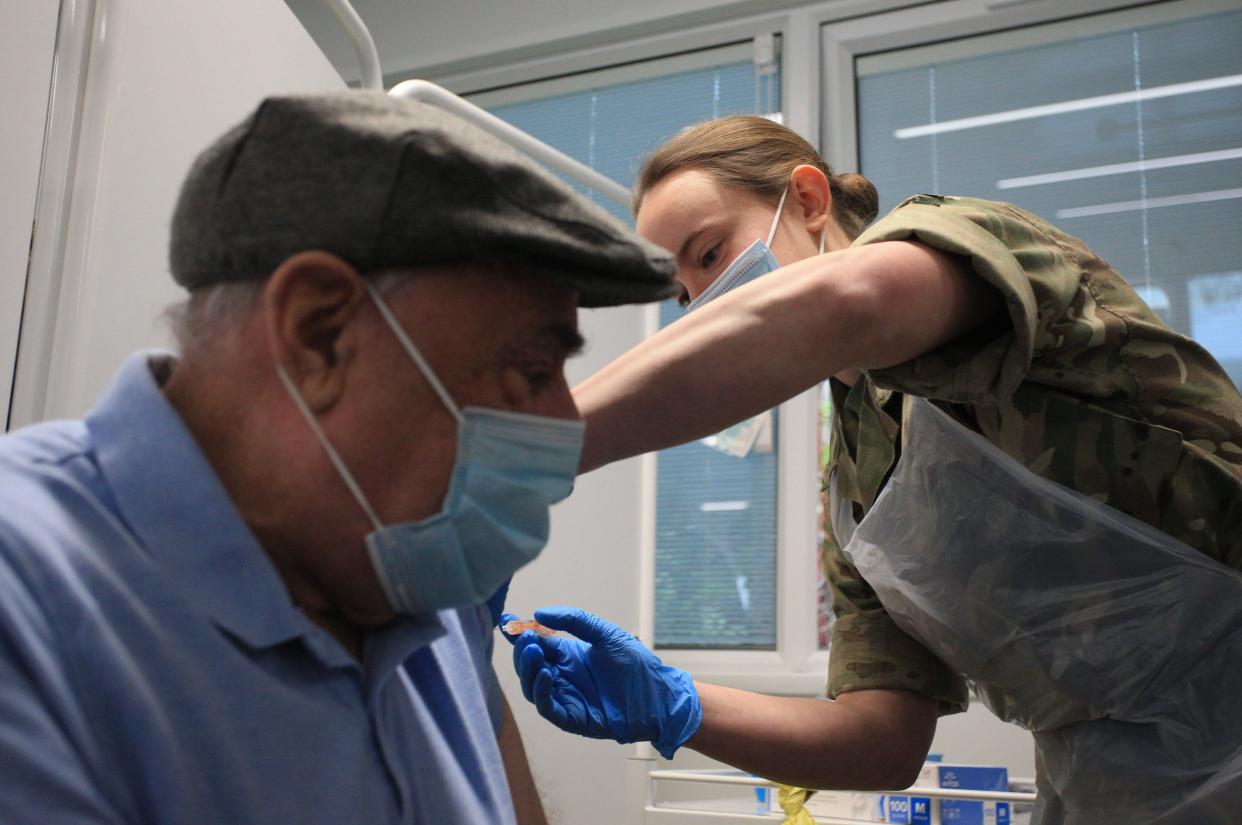Covid vaccine: 4 million first doses administered as UK makes key progress among top priority groups

More than four million people in the UK have now received a first coronavirus vaccine dose, the latest figures show, as crucial progress continues to be made nationally in inoculating all over-80s and care-home residents.
The government remains optimistic that it will be able to provide jabs to around 15 million high-priority people across the UK by 15 February, including health and social care staff, the elderly and those in care homes.
On the day that vaccination invitations were sent out to hundreds of thousands of people in their 70s, the government announced that a total of 4,062,501 Britons had been administered with a first dose as of Sunday.
Heath secretary Matt Hancock said the UK’s rollout was “clearly on track” but refused to be drawn on when restrictions would be eased, insisting that the government need to see proof of the vaccination programme working and “pressure on the NHS reducing”.
Prime minister Boris Johnson said the transition out of lockdown would be gradual, with no great “open sesame” moment when curbs on freedoms are suddenly lifted.
Despite the progress, there have been regional variations in the rollout of the vaccine.
As of Saturday, 5.9 per cent of the population in England had been vaccinated, compared with 4.1 per cent in Scotland, 4 per cent in Wales and 7.4 per cent in Northern Ireland.
NHS data showed London had delivered the lowest number of vaccinations across England, with a total of 417,225 first and second doses administered between 8 December and 17 January. In contrast, the Midlands had rolled out 746,487 doses.
The government also revealed on Monday that all care-home residents in Slough have now received a first vaccine dose, as is also the case in Newcastle and Darlington.
Throughout England, half of over-80s and half of care-home residents have been vaccinated.
When asked about the different speeds at which some local authorities were moving, Mr Hancock said the government was “prioritising the supply of the vaccine into those parts of the country that need to complete the over-80s”.
“The critical thing is to make sure that everybody can get it, that we’re putting more supply into the areas that have got more to do,” he added.
The Welsh government faced accusations of a “go-slow” vaccination strategy after first minister Mark Drakeford said there was no point in rushing to administer all available doses this week if it meant vaccinators were “standing around with nothing to do for another month”.
"The sensible thing to do is to use the vaccine you’ve got over the period that you’ve got it for so that your system can absorb it, they can go on working, that you don’t have people standing around with nothing to do,” he said.
Critics described his comments as astonishing, as Downing Street waded into the row. Allegra Stratton, the prime minister’s press secretary, said she was sure all devolved leaders wanted to “see jabs in everybody’s arms as quickly as is sensibly possible”.
Throughout England’s primary care networks, supplies of the vaccine are arriving in waves, making it difficult to deliver a smooth and rolling programme for local patients.
Therese Coffey, the work and pensions secretary, admitted that the rollout was "not quite working right” and had issues to be resolved.
She said she had been told younger people were getting vaccinated before some over-80s, and even over-90s, in her Suffolk constituency.
Vaccines minister Nadhim Zahawi downplayed such concerns and suggested that over-70s would not be invited for their jabs until more than 90 per cent of the over-80s in a region had already been vaccinated.
“Anyone who is over 80 watching us this morning should not worry because we are making sure that those areas have vaccinated the majority of their over-80s,” he told the BBC.
However, he said that vaccine supply was the limiting factor in the rollout.
Mr Zahawi explained that Pfizer was temporarily reducing its vaccine deliveries to Europe while it upgraded its production capacity.
“There's bound to be delays,” he said. “Any new manufacturing process has challenges at the outset, it is lumpy, it begins to stabilise and get better and better week in, week out.
"The Pfizer/BioNTech vaccine is a messenger RNA chemical, difficult chemical to manufacture, very very challenging but they’re doing really well, they want to do more, which is why they’re reconfiguring to add volume to the whole world.”
He said Britain was on course to hit its rollout targets, with 140 people being vaccinated each minute on average.
He added the UK was hoping to receive 2 million vaccines a week from AstraZeneca but that those numbers would not be reached until the middle of next month.
The government also announced on Monday that 24-hour vaccination sites will be tried out in London by the end of the month.
Stephen Powis, the NHS national medical director for England, said the programme would start within the next week or two.
Read More
WHO raises 'concerns' about Mideast vaccine inequity
WHO chief lambasts vaccine profits, demands elderly go first
Something ‘not quite working right’ in vaccine roll-out, minister says

 Yahoo Movies
Yahoo Movies 
